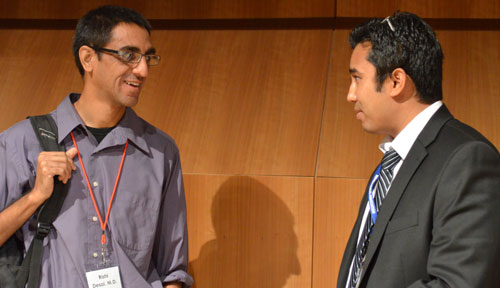Rishi Desai, M.D., admits he didn’t attend all of his medical school classes at the University of California, San Francisco.
So the idea of a free world-class education — the very mission of the Khan Academy — resonates strongly with him.
Today, the pediatric infectious disease physician and medical educator at Khan Academy wants to use the popular online resource to connect people to quality information about health and medicine.
And he wants everyone’s help.
Dr. Desai, who spent two years as an epidemic intelligence service officer with the Centers for Disease Control and Prevention, recently spoke with campus leaders, faculty and students about how technology is changing the learning environment.
While here, he also encouraged faculty and students to submit videos — good, reliable, engaging content — to help build Khan’s medical and pre-health video library. (See sidebar for details.)
Margot Chima and Sara Schenk, both first-year medical students at UNMC, know the value in such an online curriculum.
“Thank you for getting us through cardio physiology,” they told Dr. Desai, noting how Khan’s online tutorials helped them contextualize details.
“It let us zoom out and see the big picture,” Schenk said.
Chima also is interested in learning when technology can streamline health care — and when it can’t.
Dr. Desai acknowledges it can’t develop someone’s interpersonal or leadership skills, or enhance team building and clear communication. Those are still best done face-to-face, he said. But shared, interdisciplinary content does enable students to learn at their own pace, receive instant feedback, select videos and interactive challenges that resonate best with them, synthesize connections between topics and access life-long learning resources.
“Build the road and the cars will follow,” Dr. Desai said.

Other companies are beginning to be inspired by websites such as Khan or MathTV.com to help provide a world-class education for people everywhere.